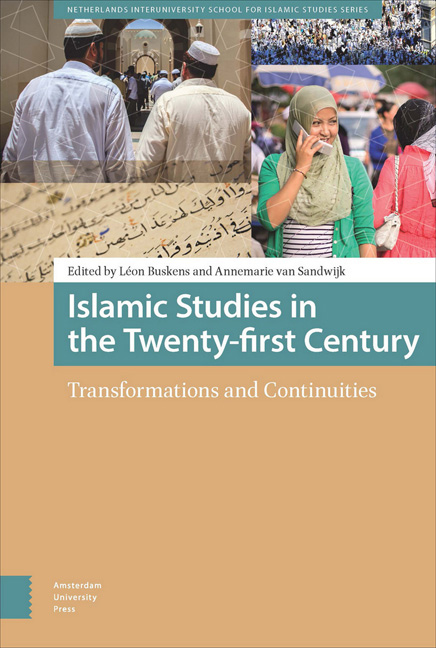Book contents
- Frontmatter
- Dedication
- Contents
- Preface
- Introduction: Dichotomies, Transformations, and Continuities in the Study of Islam
- Islamic Texts: The Anthropologist as Reader
- Textual Aspects of Religious Authority in Premodern Islam
- What to Do with Ritual Texts: Islamic Fiqh Texts and the Study of Islamic Ritual
- Textual Study of Gender
- Scholarship on Gender Politics in the Muslim World: Some Critical Reflections
- Power, Orthodoxy, and Salvation in Classical Islamic Theology
- Dialectical Theology in the Search for Modern Islam
- “Classical” Islamic Legal Theory as Ideology: Nasr Abu Zayd’s Study of al-Shafiʿi’s al-Risala
- Islamic Law in the Modern World: States, Laws, and Constitutions
- Vernacular Cosmopolitanism as an Ethical Disposition: Sufi Networks, Hospitality, and Translocal Inclusivity
- Middle Eastern Studies and Islam: Oscillations and Tensions in an Old Relationship
- Notes on Contributors
- Overview of NISIS Autumn Schools, 2010-2014
- Index
Dialectical Theology in the Search for Modern Islam
Published online by Cambridge University Press: 12 December 2020
- Frontmatter
- Dedication
- Contents
- Preface
- Introduction: Dichotomies, Transformations, and Continuities in the Study of Islam
- Islamic Texts: The Anthropologist as Reader
- Textual Aspects of Religious Authority in Premodern Islam
- What to Do with Ritual Texts: Islamic Fiqh Texts and the Study of Islamic Ritual
- Textual Study of Gender
- Scholarship on Gender Politics in the Muslim World: Some Critical Reflections
- Power, Orthodoxy, and Salvation in Classical Islamic Theology
- Dialectical Theology in the Search for Modern Islam
- “Classical” Islamic Legal Theory as Ideology: Nasr Abu Zayd’s Study of al-Shafiʿi’s al-Risala
- Islamic Law in the Modern World: States, Laws, and Constitutions
- Vernacular Cosmopolitanism as an Ethical Disposition: Sufi Networks, Hospitality, and Translocal Inclusivity
- Middle Eastern Studies and Islam: Oscillations and Tensions in an Old Relationship
- Notes on Contributors
- Overview of NISIS Autumn Schools, 2010-2014
- Index
Summary
Studies on Islam and modernity have grappled with what has happened to Islam in the modern world. As a tradition, culture, or religion, what has become of Islam since the transformation of the globe through industrialisation, capitalism, and colonialism? Has Islam taken on a new form, or does it continue earlier forms and traditions in essential ways? What are the values promoted by Islam and Muslims in the modern world? Most recent studies on these questions find the focus on Islam and modernity too broad and generalised. Preferring local and contextual studies, Islam in modernity in its most general sense has been moved to the background, or into the public sphere. However, terms referring to the broader interaction between Islam and modernity have not been given up. Terms such as “Islamic modernity,” “Islamic modernism,” “modernist Islam,” or simply “modern Islam” have not disappeared completely. To these may be added the plural forms of Islams and modernities, producing a bewildering variety of representations. They still appear repeatedly in the literature, begging for clarification or filling an un-fillable space.
The questions and formulations of modern Islam have been dependent on the use and meaning of “modern” and “Islam.” Both these terms are used extensively, and unavoidably, to identify the particular turn of modern Islam. The use of “modern” ranges from the Marxist, to the liberal, to Weberian, and also to postcolonial and postmodern definitions and inclinations. The Weberian definition and assumptions of modernity have dominated literature on modern Islam, and occupy pride of place. Like the term “modern,” the reference to Islam cannot be taken for granted. The unified and obvious reference to a single tradition breaks down upon closer scrutiny. In his magisterial study of Islam, Hodgson offered a set of terms (Islam, Islamic, Islamicate and Islamdom) that privileged religious foundations, while giving space to cultural and other historical developments. His suggestions have not found great favour among scholars of Islam, least of all among those who work in the study of modern Islam. But the search for a proper term for Islam has continued into the twenty-first century. One persistent suggestion since the 1970s has been the use of “Islams” to reflect the multiplicity of interpretations and cultural formations that constitute religious experiences (El-Zein 1977).
- Type
- Chapter
- Information
- Islamic Studies in the Twenty-first CenturyTransformations and Continuities, pp. 161 - 182Publisher: Amsterdam University PressPrint publication year: 2017



